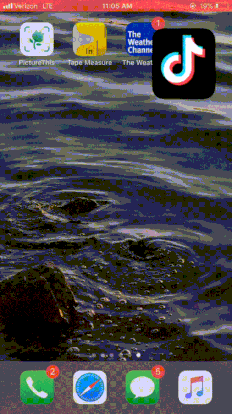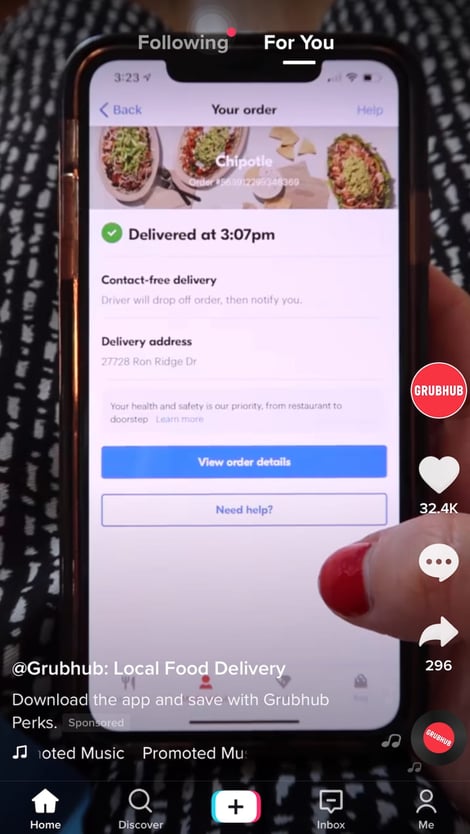- Like
- SHARE
- Digg
- Del
- Tumblr
- VKontakte
- Flattr
- Buffer
- Love This
- Save
- Odnoklassniki
- Meneame
- Blogger
- Amazon
- Yahoo Mail
- Gmail
- AOL
- Newsvine
- HackerNews
- Evernote
- MySpace
- Mail.ru
- Viadeo
- Line
- Comments
- Yummly
- SMS
- Viber
- Telegram
- JOIN
- Skype
- Facebook Messenger
- Kakao
- LiveJournal
- Yammer
- Edgar
- Fintel
- Mix
- Instapaper
- Copy Link
Musical.ly, created in 2014, was a music sharing app whose users would share short videos of themselves lip-synching to different music snippets. The platform was among the top 100 downloaded apps for two years straight, and users posted around 13 million videos per day.
In 2018, Musical.ly was purchased by Chinese tech firm Bytedance and merged with the firm’s new app, TikTok. TikTok, like Musical.ly, is a video sharing social network where users share short clips of themselves lip-synching and dancing to trending music. It’s since expanded to house more diverse videos, like short comedy skits and how-to home improvement videos.
After the merger, TikTok’s active user base grew by almost 800%. With such sizable user activity, marketers have realized that the advertising potential on the app is high. The creators of TikTok have also realized this and recently launched a new platform called TikTok For Business.
What is TikTok For Business?
TikTok For Business is an all-in-one tool for marketers to advertise on TikTok. Instead of devising their own strategy, the platform helps marketers through the entire process of creating advertisements, setting budgets, reaching target audiences, and analyzing campaign data.
The platform’s stated goal is to help businesses unleash their creative side by teaching them how to use the app through their e-learning service and guiding them through making advertisements on the Ads Manager platform.
Marketing Options on TikTok For Business
The sole marketing format for businesses to use on TikTok is video advertisements. The TikTok For Business Ads Manager platform helps marketers create these advertisements, and they can choose from five different formats.
TopView Ads
TopView ads on TikTok are videos that appear once a day, immediately after a user opens their app for the first time. Here’s an example of a TopView ad by candy company M&M that they’ve created to advertise a virtual Halloween experience.
TopView ads can be up to 60 seconds long, which is longer than the typical run-time for TikTok videos. Because of this, it’s perfect for businesses looking to advertise products or services that require longer periods of attention, like TV trailers.
In-Feed Ads
In-Feed ads are videos that appear on a user’s discovery page, otherwise known as a For You page. This is where users land when they open the app. The For You page features videos that the TikTok algorithm believes are of interest to the user based on their app activity.
These ads are the fourth video users see as they scroll through their feed. For reference, this type of advertisement is similar to those that appear in a user’s Instagram feed. Here’s an example of an In-Feed ad created by food delivery service GrubHub.
In-Feed ads are especially valuable for marketers looking to use TikTok to drive sales conversions, as the videos can feature a call-to-action (CTA). Acorns, a finance business, has used the In-Feed CTA feature to prompt viewers to download their app.
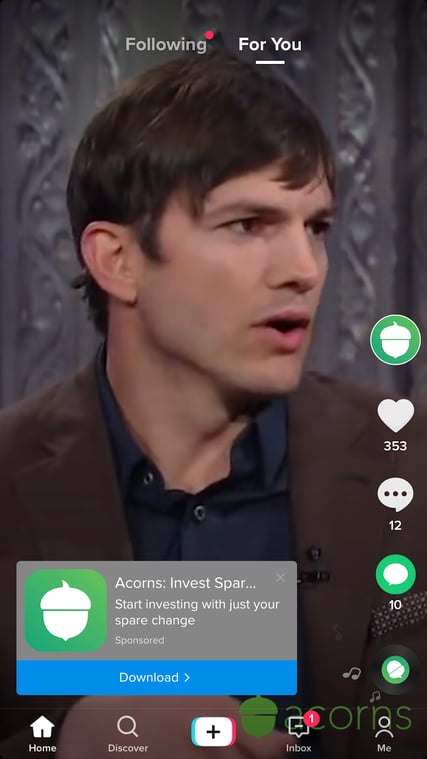
Some brands have created their own version of In-Feed ads by partnering directly with influencers. For example, Raising Cane’s Restaurant partnered with famous TikTok influencer Chase Hudson to promote their business (you can check it out in the video below).
Users who follow Hudson would see this video within their For You feed.
Branded Hashtag
Branded Hashtags are advertisements that businesses use to inspire TikTokers to create content around a brand-related hashtag of their choice. Businesses using this ad format have exclusive access to the hashtag, which is not the case on other social media sites. Its exclusivity comes along with a high price tag, and reported average costs are around $150,000 USD for six days.
For example, say you’re a sportswear company that has just launched a new athletic shirt called Blue Shirt. You may create a branded hashtag called #InMyBlueShirt, where you encourage TikTok users who have your product to post videos of them doing physical activities in the shirt.
Jennifer Lopez, a music artist, has used the Branded Hashtag feature to advertise her song, Pa Ti. The hashtag is called #PaTiChallenge, and Lopez posted a video of herself dancing where she encouraged other TikTok users to take part in the challenge by replicating her dance.
The #PaTiChallenge hashtag has garnered 2.4 Billion views.
Hashtag Challenges can be featured on TikTok’s Discover page, where users can find new creators and browse trending hashtags. The Discover page is similar to Instagram’s Explore page.
The hashtag challenge #WorldSeries, sponsored by Major League Baseball, is featured on TikTok’s Discover feed, and the hashtag encourages users to post videos showing how they’ve celebrated baseball games. Clicking on the hashtag brings users to an internal landing page that features the sponsors’ logo, challenge description, and other videos using the hashtag.
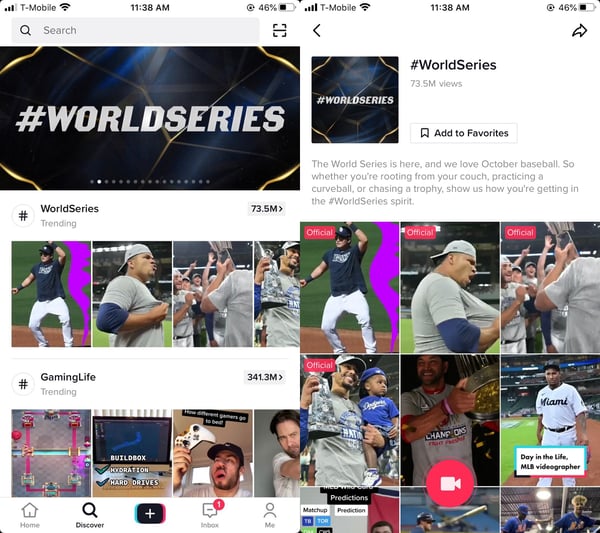
Brand Takeovers
Brand Takeovers are an ad format that can include TopView, In-Feed, and Branded Hashtags all at once. They can also be videos, gifs, or still images. The takeover aspect of these ads is that TikTok only features one business per day, and the starting cost is around $50,000 USD per day.
Guess, a fashion company, ran a Brand Takeover on TikTok to advertise their denim jeans. Over six days, their TikTok account gained over 12 thousand new followers and generated a 14.3% total engagement rate. Their Brand Takeover included Top View, Branded Hashtag, and In-Feed ads.
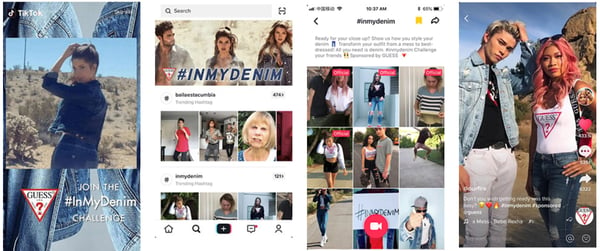
Branded Effects
Branded Effects ads use 2D, 3D, or AR to add images of your products into TikTok videos. Brands typically create stickers of their products or create filters that TikTokers can use when creating their videos. These filters and stickers increase engagement and brand awareness, as using them typically involves playing brand-specific games.
Puma, a clothing company, used the Branded Effects feature to advertise their new soccer shoes. Their 3D sticker prompted users to play a virtual reality game with a soccer ball. They paired their Branded Effects sticker with a hashtag challenged that generated over 100,000 videos of user generated content.
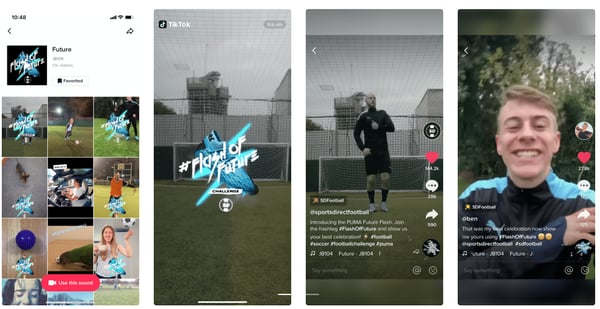
Should you use TikTok For Business in your marketing strategy?
TikTok For Business comes at a time when it’s evident that businesses have had success with advertising on TikTok.
Take Dunkin’, for example. Dunkin’, also known as Dunkin’ Donuts, is an American coffee company. They’ve capitalized on the advertising abilities of TikTok and partnered with a popular influencer, Charli D’amelio, who often drinks their coffee in her videos.
At only 16-years-old, D’amelio has over 7 million followers on TikTok. While her platform is primarily centered around dancing videos, she announced her partnership with Dunkin’ in a TikTok video that has been viewed over 59 million times in less than two months. Dunkin’ reported that they saw a 45% sales boost the day after the announcement.
Ultimately, the decision to use TikTok For Business in your marketing strategy depends on your overall business goals and desired campaign outcomes. To make the decision easier, we’ve compiled a pro and cons list for marketers to use when making this decision.
TikTok For Business Pros and Cons
pros | Cons |
TikTok Ads Manager will help you expose your content to new audiences. The ‘similar audiences’ feature helps you select lookalike audiences that are similar to your target ones. TikTok has over 600 million active monthly users and is available in 155 different countries. If your brand is smaller or less well-known, this could bring significant awareness to new audiences. 32.5% of TikTok’s user base is between 10 and 19, and 29.5% are between 20 and 29. If your target audiences are of different age groups, you could gain exposure to a new type of customer. | TikTok’s largest user base is not representative of all demographic groups. Since its primary user base is very young, the audiences that businesses market to on the platform may be significantly younger than intended target audiences. Advertising on the app may require you to tap into a user base that may not understand the need for your product or service. |
TikTok thrives off of informal, ‘behind-the-scenes’ content. Authenticity matters to Generation Z, and they tend to shy away from the ‘ sales-to-drive ’ leads marketing ads. If your brand or business typically creates sales-driven formal content, utilizing the platform can help you diversify your content types and display a new, creative side of your business. | TikTok requires niche content. The type of content that TikTok calls for may not be in-line with your brand mission. If you’re a more serious, sales-focused business, learning to adapt to the fun and exciting content required for TikTok versus just driving sales conversions may be a difficult skill to learn. |
44.81% of the world’s population owns a smartphone. As the number of mobile users worldwide continues to grow, having a mobile-first marketing strategy is worth considering. You can use TikTok for Business to create advertisements on your phone and essentially run a portion of your marketing strategy from your pocket. | It’s not easy to link your website to your TikTok videos. If your website is your primary way of converting leads, you’ll need to get creative and develop additional ways to drive leads. |
TikTok has higher engagement rates than Instagram and Twitter. In 2019, TikTok’s average engagement rate at all follower levels was higher than both Instagram and Twitter. Small accounts with just 1,000 had an average engagement rate of 9.38% . Even if you’re a smaller brand just starting on TikTok, you’re guaranteed to have an engaging audience. | TikTok For Business reporting tool can’t be integrated with other platforms. All marketers know that data is crucial to understanding the success of marketing campaigns. At the moment, it doesn’t seem as though the platform can integrate with your preferred insights tool. While the Ads Manager is convenient, it will require an additional step for collecting data that you can use to understand your campaign engagement and ROI. |
TikTok For Business can be a valuable tool.
Should you choose to incorporate TikTok’s new service into your marketing strategy, it can be a valuable tool for growth. While the app does call for niche types of content, brands and businesses can diversify their strategy and advertise to a new audience.
Whatever your final decision is, TikTok For Business is available to those who want to harness the app’s advertising potential.
Originally published Nov 2, 2020 7:00:00 AM, updated November 02 2020

![→ Free Download: Social Media Calendar Template [Access Now]](https://no-cache.hubspot.com/cta/default/53/3e56e15d-47bd-46c9-a256-99fde52abfe7.png)
